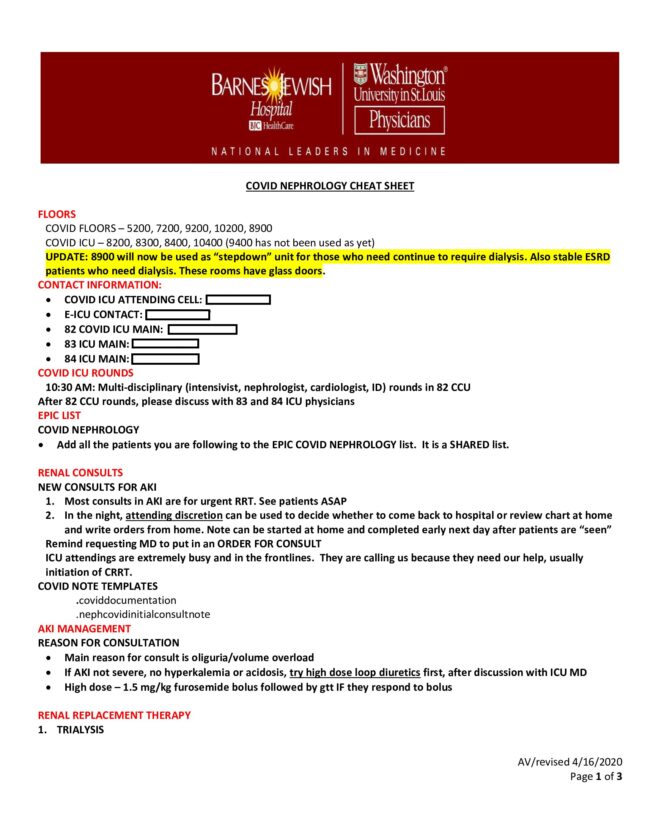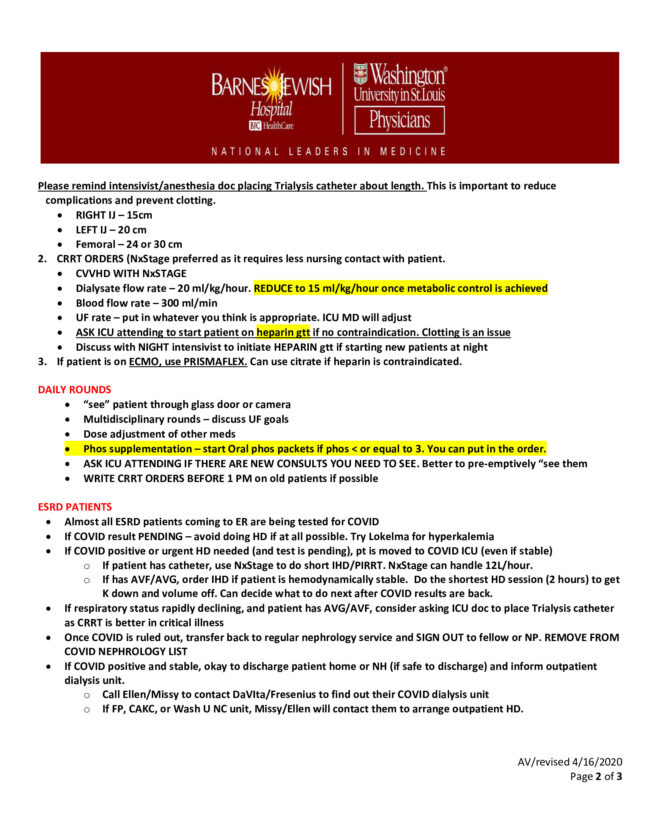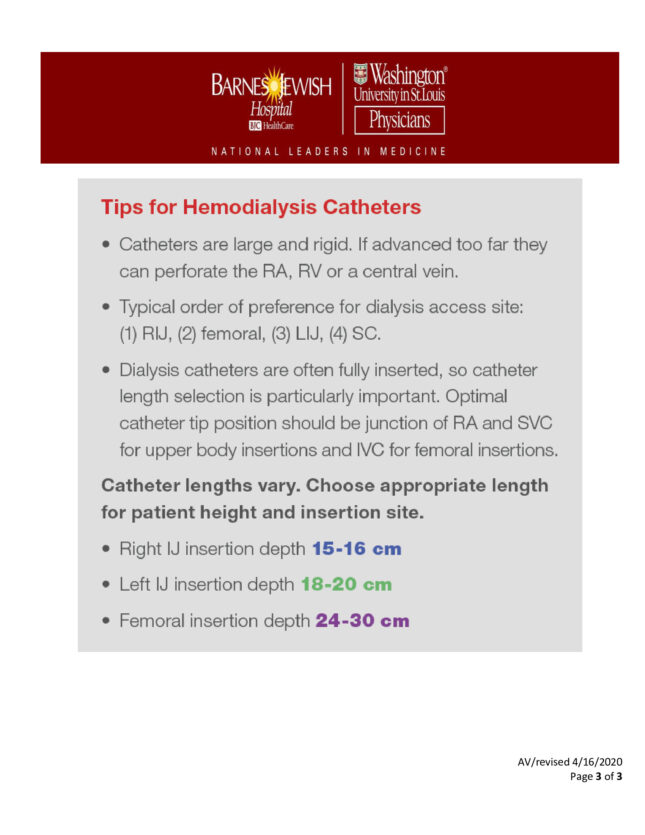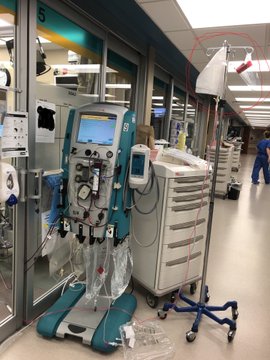
A Prismaflex CRRT (Continuous Renal Replacement Therapy) machine is place outside a COVID-19 positive patient’s ICU room. Having the machine outside the room reduces healthcare workers’ exposure.
Being Prepared
Even before the first COVID-19 positive patient was identified in the St. Louis area, the Division of Nephrology was preparing for the coming crisis knowing that it would be a matter of when it would happen, not if it would happen. The Division had a unified goal: continue to deliver superb clinical care for our outpatients and inpatients, while taking all available and reasonable measures to protect the patients and staff from COVID-19.
Because of the prevalence of underlying health problems, patients with end-stage kidney disease are at a higher risk for developing serious complications from COVID-19. Therefore, it was necessary for the division to strategize how to prevent transmission of the virus in the dialysis units and manage suspected or confirmed Covid-19 patients in our outpatient dialysis units.
Our nephrologists also knew that hospitalized, critically ill COVID-19 patients were at a high risk for developing acute kidney injury (AKI). Dr. Anitha Vijayan, medical director for Acute Dialysis Services at Barnes Jewish Hospital, worked with the BJH dialysis nurse manager to institute guidelines for the management of COVID-19 patients with AKI. In order to protect the fellows, the faculty created an attending-only COVID service, and Dr. Vijayan created a “cheat sheet” (see below) to help the attending nephrologists manage dialysis treatments and conserve resources. The cheat sheet highlights protocols for renal consults, COVID ICU rounds, acute kidney injury management, renal replacement therapy, daily rounds, management of end stage renal disease patients, and other considerations when taking care of COVID-19 patients.

Anitha Vijayan created “cheat sheat” for the attendings-only COVID clinical service.
The attending-only nephrology COVID clinical service, a totally voluntary service, is now in its fourth week. Drs. Ben Humphreys and Anitha Vijayan staffed the first two weeks, paving the way for Drs. Seth Goldberg and Patricia Kao, who took over on week three. Drs. George Jarad and Timothy Yau are staffing week four. The fifth week of the service will be covered by Drs. Charbel Khoury and Seth Goldberg. The first positive COVID-19 positive patient on service was seen on 03/20/20. The COVID nephrology service grew steadily, the number of hospitalized patients increased and at one point had 29 patients in the COVID ICUs.
Dr. Vijayan says, “I am amazed at the dedication of the acute dialysis and ICU staff who are working tirelessly to help the patients during this critical time. It is a privilege to work with such generous and brave colleagues and staff. We come to work every day with the attitude that #weareallinthistogether.”
Problem Solving
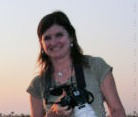
Jodean Baldauf helped set up the means to monitor COVID-19 testing status of our patients in EPIC.
Early on, the challenge was how to identify our outpatient dialysis patients’ COVID-19 testing and results. Due to the contagious nature of this virus, our dialysis centers set up procedures to screen and isolate positive COVID-19 patients and patients under investigation. To ensure the patients were properly placed in the dialysis centers, it was imperative to know their status. Jodean Baldauf, nephrology’s senior director of business operations & business development, was instrumental in setting up the means to monitor the COVID-19 testing status of our patients via EPIC. EPIC is the electronic medical records system that allows patient information to be shared easily, quickly and safely among healthcare providers across BJC’s multiple hospitals and physician offices.
“We are fortunate to have many individuals at the university who are great at problem solving,” says Baldauf. Ken Scholl, business & technology application analyst III, WashU EPIC reporting, created reports for our division to use to quickly monitor our patients’ lab results. “I have worked with Ken in the past on Outcome Reports. As in the past, he was extremely helpful and immediately created a way to solve our problem. He quickly responded and was so eager to help.”
In addition, many individuals at the university and hospital heeded Baldauf’s call for assistance. The EPIC1 team, including Tish Hatley, BSN, RN, coordinator, clinical informatics, BJH, and Kayla McWay, MSN, RN, BSN, analyst III, EPIC inpatient orders, set up a method to quickly screen and monitor patients’ lab values for our inpatient service. This system was deployed system-wide to assist all providers. Including the COVID-19 testing status of our patients in EPIC optimizes communication, including to outlying hemodialysis units that come to Barnes and are admitted to the hospital. “I am grateful for the EPIC support staff who were so responsive and critical to leading this implementation,” says Baldauf.
Baldauf keeps in touch with the WashU/BJH Command Center, which is comprised of representatives from the university and the hospital, communicating with specific key individuals responsible for nephrology, including Mohammed Agha and Michelle Argent. “This is an opportunity to share information that impacts all of us,” she says. Baldauf also initiated a weekly call with representatives from local St. Louis DaVita and Fresenius offices as well as transportation companies to keep communication channels open about our dialysis patient population. “Jamie Miles, administrative coordinator, Forest Park Kidney Center, has been vital in bringing forth updates on patient transportation concerns and changes.”
A weekly COVID-19 ZOOM Conference Call gives nephrology healthcare workers the opportunity to discuss topics such as supply procurement, patient transport, patient testing, staffing, telecommunication, dialysis unit updates, etc.
A Common Goal
Baldauf is proud of how everyone in the division has stepped up to help during this stressful time. “We have a great team, and everyone is working very hard. From the research staff, front line patient care staff, dialysis unit managers, renal outpatient staff, physicians and fellows, everyone is supportive, innovative and helpful. The stress level is very high, and everyone is anxious, but we all have a common goal – to provide the highest level of quality care and customer service to our patients and each other. It is amazing to see how each and every person is committed to our patients and the division.”
On Twitter, follow Ben Humphreys @HumphreysLab, Anitha Vijayan @VijayanMD, Seth Goldberg @sgoldber99, Patricia Kao @kao_patricia, Timothy Yau @Maximal_Change, Charbel Khoury @Charbel_Khoury, and WashU Nephrology @WUNephrology. Visit us on Facebook at @WUSTLNephology.
